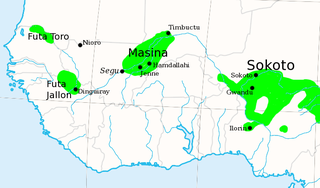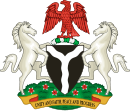Shehu Usman ɗan Fodio was a Fulani scholar, Islamic religious teacher, revolutionary and a philosopher who founded the Sokoto Caliphate and ruled as its first caliph. After the successful revolution, the "Jama'a" gave him the title Amir al-Mu'minin. He rejected the throne and continued calling to Islam.
Hausa–Fulani are people of mixed Hausa and Fulani origin. They are primarily found in the Northern region of Nigeria, most of whom speak a variant of Hausa or Fula or both as their first language.

The Jihad of Usman dan Fodio was a religio-military conflict in present-day Nigeria and Cameroon. The war began when Usman dan Fodio, a prominent Islamic scholar and teacher, was exiled from Gobir by King Yunfa, one of his former students.

The Sokoto Caliphate, also known as the Sultanate of Sokoto, was a Sunni Muslim caliphate in West Africa. It was founded by Usman dan Fodio in 1804 during the Fulani jihads after defeating the Hausa Kingdoms in the Fulani War. The boundaries of the caliphate are part of present-day Cameroon, Burkina Faso, Niger, and Nigeria. By 1837, the Sokoto state had a population of around 10-20 plus million people, becoming the most populous empire in West Africa. It was dissolved when the British, French and Germans conquered the area in 1903 and annexed it into the newly established Northern Nigeria Protectorate, Senegambia and Niger and Kamerun respectively.
Muhammadu Bello was the second Sultan of Sokoto and reigned from 1817 until 1837. He was also an active writer of history, poetry, and Islamic studies. He was the son and primary aide to Usman dan Fodio, the founder of the Sokoto Caliphate and the first Sultan. During his reign, he encouraged the spread of Islam throughout the region, increasing education for both men and women, and the establishment of Islamic courts. He died on October 25, 1837, and was succeeded by his brother Abu Bakr Atiku and then his son, Aliyu Babba.

Nigerian literature may be roughly defined as the literary writing by citizens of the nation of Nigeria for Nigerian readers, addressing Nigerian issues. This encompasses writers in a number of languages, including not only English but Igbo, Urhobo, Yoruba, and in the northern part of the county Hausa and Nupe. More broadly, it includes British Nigerians, Nigerian Americans and other members of the African diaspora.

Usmanu Danfodiyo University, Sokoto (UDUS), also known as UDUSOK, is a public research university located in the city of Sokoto, north western Part of Nigeria. It is one of the initial twelve universities founded in Nigeria by the federal government in 1975.
Mallam Abdullahi ɗan Fodio, a prominent Islamic scholar, jurist, poet and theologian, was the first Amir of Gwandu and first Grand Vizier of Sokoto. His brother, Usman dan Fodio (1754–1817) was the founder of the Sokoto Caliphate. Usman, being more of a scholar than politician, delegated the practical regency of the western part of his empire to Abdullahi and the eastern part to his son Muhammed Bello, who later became the Sultan of Sokoto after his father.
Muhammadu Junaidu was a Nigerian historian, writer and one of the foremost scholars on Fulani history and the Sokoto Caliphate. He held the title of the Waziri of Sokoto.

The Hausa are a native ethnic group in West Africa. They speak the Hausa language, which is the second most spoken language after Arabic in the Afro-Asiatic language family. The Hausa are a culturally homogeneous people based primarily in the Sahelian and the sparse savanna areas of southern Niger and northern Nigeria respectively, numbering around 86 million people, with significant populations in Benin, Cameroon, Ivory Coast, Chad, Central African Republic, Togo, Ghana, as well as smaller populations in Sudan, Eritrea, Equatorial Guinea, Gabon, Senegal, Gambia. Predominantly Hausa-speaking communities are scattered throughout West Africa and on the traditional Hajj route north and east traversing the Sahara, with an especially large population in and around the town of Agadez. Other Hausa have also moved to large coastal cities in the region such as Lagos, Port Harcourt, Accra, Abidjan, Banjul and Cotonou as well as to parts of North Africa such as Libya over the course of the last 500 years. The Hausa traditionally live in small villages as well as in precolonial towns and cities where they grow crops, raise livestock including cattle as well as engage in trade, both local and long distance across Africa. They speak the Hausa language, an Afro-Asiatic language of the Chadic group. The Hausa aristocracy had historically developed an equestrian based culture. Still a status symbol of the traditional nobility in Hausa society, the horse still features in the Eid day celebrations, known as Ranar Sallah. Daura is the cultural center of the Hausa people. The town predates all the other major Hausa towns in tradition and culture.

The Fulajihads sometimes called the Fulani revolution were a series of jihads that occurred across West Africa during the 18th and 19th centuries, led largely by the Muslim Fula people. The jihads and the jihad states came to an end with European colonization.
Nana Asmaʾu was a Fula princess, poet, teacher, and a daughter of the founder of the Sokoto Caliphate, Usman dan Fodio. She remains a revered figure in northern Nigeria. She is held up by some as an example of education and independence of women possible under Islam, and by others as a precursor to modern feminism in Africa.

Shehu al-Hajj Muhammad al-Amîn ibn Muhammad al-Kânemî (1776–1837) was an Islamic scholar, teacher, religious and political leader who advised and eventually supplanted the Sayfawa dynasty of the Kanem-Bornu Empire. In 1846, Al-Kanemi's son Umar I ibn Muhammad al-Amin became the sole ruler of Borno, an event which marked the end of the Sayfawa dynasty's eight hundred year rule. The current Shehu of Bornu, a traditional ruler whose seat remains in modern Borno State, Nigeria, is descended from Al-Kanemi.
For the Arab Hutaymi tribe, see Sulluba
Modibbo Raji was a 19th-century Fulani Islamic scholar who was part of the community of Usman Dan Fodio, founder of the Sokoto Caliphate, and his brother Abdullahi dan Fodio. After a long career as a teacher, Qadi, Naib and Wazir (vizier) in the Gwandu Emirate under his mentor Abdullahi dan Fodio and his successors, Modibbo Raji emigrated in the 1850s and eventually settled in Adamawa. He is generally regarded as the founder of the Islamic scholarly tradition in Adamawa as well as one of the earliest exponents of the Tijjaniyya Islamic sect in the Sokoto Caliphate. He died c. 1865 and was buried in Yola leaving behind his writings both in Arabic and Fulfulde, and a large scholarly community of his sons, daughters, students and associates.

Muhammadu Bello KagaraHausa pronunciation:[MuhammadBelloKagara] was an educator, a writer and a royalist. He wrote the famous book novel known as Gandoki, the novel is a manuscript written during a literature bureau competition organized in 1933 by Rupert East. His book Ganɗoki was considered either first or second book to be published in the entire Northern Nigeria, the first or the second being Ruwan Bagaja by Abubakar Imam.
The Yan Taru movement was started by Nana Asma'u dan Fodio in 1838 with the purpose of empowering and educating women in the then Sokoto Caliphate. The movement survived the death of its founder, end of the Caliphate and Colonialism in Nigeria still existing today.
Abd al-Qadir dan Tafa, also known as Dan Tafa, was a historian, theologian, philosopher, poet and jurist from the Sokoto caliphate. He was considered the "most learned" scholar of his time. He was a prolific scholar who delved into various fields of knowledge, but he was particularly renowned for his historical and philosophical writings.








